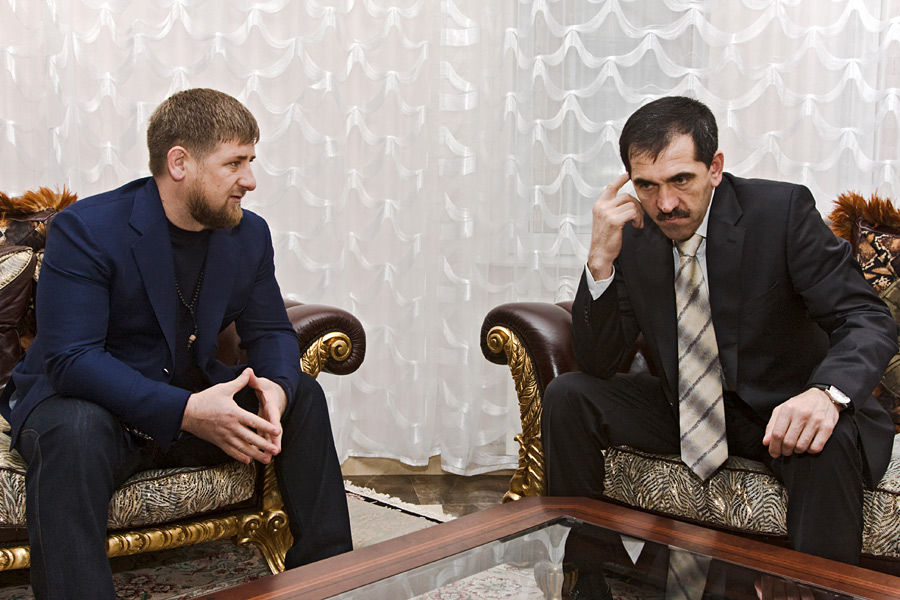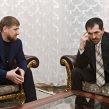
Leaders of Chechnya and Ingushetia Unite Against Salafists
Publication: Eurasia Daily Monitor Volume: 13 Issue: 33
By:

Ingushetia is presently engulfed in a dispute over accusations made by the Chechen government and religious authorities against the activities of Salafist clerics in the republic—Khamzat Chumakov and Isa Tsechoev. Chechnya’s leadership was once considered totally hostile toward Ingushetia as a whole, but the situation is now more complicated. Ingushetia’s mufti, Isa Khamkhoev, and the leaders of the Qadiriyya and Naqshbandi Sufi tarriqas (spiritual orders) in Ingushetia, have allied with Ramzan Kadyrov (Eadaily.com, February 3). Ingushetia’s mufti made this alliance with Chechnya’s governor, refusing to heed the demand by the governor of Ingushetia, Yunus-bek Yevkurov, to step down. This is not the first time that a conflict with the republican authorities pushed Ingush public figures to seek Grozny’s protection. However, Ingush society usually condemns such protection seekers.
After Khamkhoev aligned himself with Chechnya’s mufti and Kadyrov, civil organizations of Ingushetia spoke out against Ingushetia’s mufti and asked the Chechen authorities not to interfere in the republic’s affairs. Moreover, the Ingush activists called on Moscow to rein in Kadyrov and determine whether his statements against Ingush clerics qualified as extremist. At the same time, despite Kadyrov’s attacks on the Salafist preacher Isa Tsechoev, Ingushetia’s rights activists declared the preacher the winner of the Heroes of the Civil Society competition (Galgayche.org, February 12). Thus, Ingushetia’s activists came in support of those religious leaders whom the Chechen authorities threatened with physical violence. On the other hand, Yevkurov, Ingushetia’s governor and Kadyrov’s bitterest enemy of the past 4–5 years, unexpectedly came out in support of the Chechen ruler (Onkavkaz.com, February 7). Yevkurov may have been trying to deescalate the situation. However, the Chechen authorities supported the Ingush mufti while the governor of Ingushetia asked him to resign multiple times publicly—on TV, at meetings with civil society activists, during government meetings, and so on (Kommersant, February 11).
Yevkurov’s support for Kadyrov should be interpreted as support for the Sufis and an attempt to limit the influence of Salafist preachers in Ingushetia—Khamzat Chumakov and Isa Tsechoev. Kadyrov reciprocated by stating that he had a telephone conversation with Yevkurov and that they agreed on joint ideological actions against the Salafists.
This surprise rapprochement between the governors of Chechnya and Ingushetia sparked rumors in Ingushetia that Moscow had decided to merge the two republics into one entity, as they were prior to the breakup of the Soviet Union in 1991. Yevkurov was even forced to respond to the rumors, saying: “No merger is in sight and cannot be. Neither I, nor Ramzan Kadyrov raised this issue in our conversations. Our republics are developing, economic issues are resolved, social conditions are improving. We should help each other, do things together. Everybody has his own territory, his own republic and it is good that way!” (Yug.svpressa.ru, February 5).
Kadyrov also clarified his position about the unification of Chechnya and Ingushetia: “In regard to the provocative talks about my desire to unify the Chechen Republic and the Republic of Ingushetia, I can say that I will never agree with that. I swear that no one is against the merger as much as I am! Chechens and Ingush are brotherly people, but each republic has its own problems and tasks. We should not add them together” (Gazeta.ru, February 5).
On February 10, the Security Councils of Chechnya and Ingushetia held a joint session in Grozny—a development that was a surprise to residents of both Chechnya and Ingushetia. The heads of the two bodies, Chechnya’s Vakhit Usmaev and Ingushetia’s Ahmed Dzeitov, presided over the meeting, during which officials discussed a range of issues related to countering terrorism and extremism (Lentari.ru, February 12). Some Ingush websites perceived the joint meeting as proof that Moscow has secret plans to merge the two republics. “The process of the amalgamating Ingushetia into Chechnya is becoming increasingly obvious, despite the rhetoric of the two governors,” one source was quoted as saying (Magaslife.com, February 12). In reality, amalgamation is probably not an option now, and the two republics simply met to coordinate actions against Salafists after a nudge from Moscow.
One of the outcomes of the alliance between the Ingush mufti and the Chechen leadership is that Chechen Sufis will, from now on, call themselves Ahlu Sunna Sufis of Chechnya (Instagram.com/p/BBtAZzaiRu, February 12). Thus, the government is trying to snatch that term from the Salafists, who have claimed it previously in the North Caucasus. The term will become eroded, because many different groups will use it for themselves and Salafists will stop being the only “people of Sunna.” At the meeting with the Ingush spiritual leaders, Kadyrov noted for the first time that talks between the Dagestani authorities and the Salafists caused tensions in the republic. The Dagestani authorities did not react to Kadyrov’s statements, but they could mean that Moscow has chosen the same policy in Dagestan as in Chechnya—the eventual complete banning of Salafism. If Kadyrov did not misspeak, and this really is Moscow’s new policy in Dagestan, it will likely backfire, because there are tens of thousands of Salafists in Dagestan and outlawing them will result in new clashes and strengthen the armed Islamist underground opposition.
Russia is slipping into a severe crisis and frantically seeking a way to prevent an uprising in the North Caucasus. However, every move Moscow makes in the region strengthens the armed Islamist underground there, making Russia worse off.




